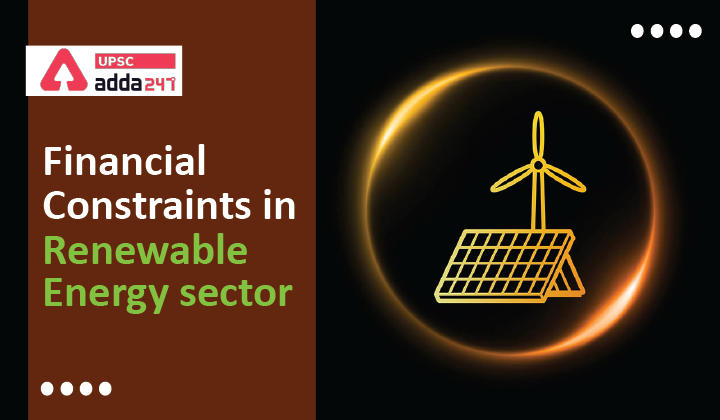Table of Contents
Renewable energy sector in India: Relevance
- GS 3: Infrastructure: Energy, Ports, Roads, Airports, Railways etc.
Renewable energy issues in India: Context
- Recently, a standing committee on energy set up by the ministry of new and renewable energy (MNRE) has put forward a report where it has asked the government to explore new and innovative tools to deal with the issue of financial constrains in the renewable energy sector.
Get Free Study Material for UPSC and State PCS Examinations
Financial Constraints in Renewable Energy Sector: Key recommendations
- Set up green banks: Green Banks have emerged as an innovative tool for accelerating clean energy financing globally, So the government should explore setting up of a green bank system to address the persisting finance-related challenges being faced by the renewable energy sector in the country.
- Prescribe Renewable Finance Obligation (RFO): The committee also suggested that MNRE should explore the possibility of prescribing Renewable Finance Obligation on the lines of Renewable Purchase Obligation (RPO) for banks and financial institutions.
- The Renewable Finance Obligation will make them invest a specific percentage of their investment in the renewable energy sector.
- Priority Sector Lending: The limit of loans for the renewable energy sector under priority sector lending should be increased and the MNRE should pursue this matter with the Ministry of Finance and the Reserve Bank of India.

- Explore alternative funding avenues: The committee also suggested that the ministry should explore innovative financing mechanisms and alternative funding avenues like Infrastructure Development Fund (IDF), Infrastructure Investment Trusts (InVITs), Alternate Investment Funds, Green/Masala Bonds, crowdfunding etc for the renewable energy sector.
- Give special window to IREDA: Indian Renewable Energy Development Agency (IREDA) should be given a special window for borrowing from the RBI at repo rate in line with other specialised financial institutions like NHB, SIDBI and NABARD to ensure availability of low-cost financial resources for the renewable energy sector.
- Restructuring of loans: The ministry should pursue the banks to restructure the loans in such a way that the EMI is kept higher in peak season of revenue generation and lower in the off-season.
- Amend Electricity Act: Electricity Act should be amended and a maximum period should be prescribed for according approvals/disposing of petitions by the State Electricity Regulatory Commissions.
- Electricity (Late Payment Surcharge) Rules, 2021: The committee recommended that the ministry should ensure proper implementation of the Electricity (Late Payment Surcharge) Rules, 2021 so that the developers get compensated for delays caused by discoms in payment of dues.
- Payment of dues: The ministry should pursue the states/discoms to clear dues on ‘first in – first out’ basis so that the oldest dues are paid first.
Read recent news about renewable energy for UPSC
| Tightening the Net Report: Net Zero Carbon Targets | Global Green Hydrogen Hub | India’s Zombie Threat | Euro Green Bond |
| Reforms in Urban Planning Capacity in India | Green Day Ahead Market | ESG Funds: Environmental Social and Governance Funds | Government Planning to Blend Green Hydrogen with Natural Gas |
| Increasing Solar Waste in India | Solar Rooftop Plant | India-US Clean Energy Agenda 2030 Partnership | World Energy Outlook 2021 |
| Cabinet Approves Green Energy Corridor Phase-2 | Renewable Energy Land Use in India | NITI Aayog’s Geospatial Energy Map of India | Status Renewable Energy in India- A Report by Institute for Energy Economics and Financial Analysis |



 TSPSC Group 1 Question Paper 2024, Downl...
TSPSC Group 1 Question Paper 2024, Downl...
 TSPSC Group 1 Answer key 2024 Out, Downl...
TSPSC Group 1 Answer key 2024 Out, Downl...
 UPSC Prelims 2024 Question Paper, Downlo...
UPSC Prelims 2024 Question Paper, Downlo...




